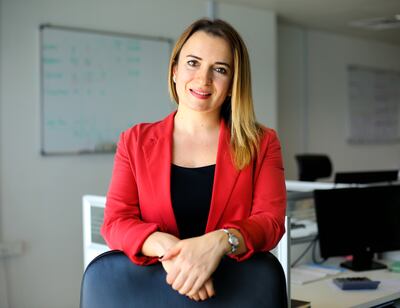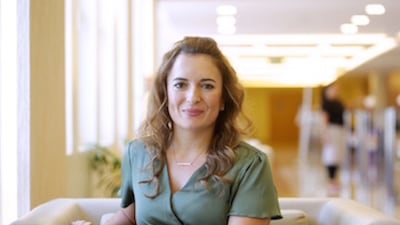When Elena Agaragimova moved to the US in 1999 from Russia at the age of 13, she was lost.
Adjusting to a new country and new way of life proved challenging, particularly when it came to deciding what she wanted to do in her career.
"It took me six years to complete my bachelor's and I changed my major five times. From the age of 15 until my early 30s, I had 17 different jobs," says Ms Agaragimova, 35, co-founder and chief growth officer of Abu Dhabi-based education technology platform Bessern.
Today, she uses her experience of growing up as an immigrant in the US to help others adapt to workplace challenges by training a new generation of graduates and holistically upskilling those already in the workforce.
Founded in 2019, Bessern leverages behavioural science to help companies focus on the overall mental health and well-being of employees. The company uses technology-powered training that focuses on micro-action-based learning to help employees develop their potential and improve their productivity and mental health.
"So how do you actually make habits that stick? This methodology of applying micro-habits daily to get you to your goal is impactful," Ms Agaragimova says.
"When it comes to any kind of change [such as] career change, people always want to make it happen very quickly. [If you take a] simple example of going to the gym, in order for you to get in shape and get to where you want to be, you need consistency and discipline. Consistency and discipline work if you're able to do it in small doses," she adds.
Bessern's learning modules allow employees to make progress on their own, measuring tangible results and receiving feedback from an assigned coach through an app.
The approach towards employee well-being with an emphasis on mental health comes amid widespread burnout and a dip in productivity following the onset of the Covid-19 pandemic. A global health crisis compounded by economic uncertainty and widespread job losses has caused a dip in employee performance and productivity.
A study by consultancy McKinsey found that stress and anxiety among the working population hit an all-time high during the pandemic, while research from the Virginia, US-based Society for Human Resource Management found that work-related concerns left more than 40 per cent of employees burnt out.
Before the Covid-19 pandemic, employee burnout cost the US healthcare system between $125 billion to $190bn, according to research published by the Harvard Business School in 2017. The costs are expected to be substantially higher as a result of the ongoing global health crisis.
"At the end of the day, if you have a person who is sitting in front of [the] computer and they're burnt out, they're not productive. They're suffering from 'presentism', which is basically a person who sits behind their computer for eight hours a day. They're there, but they're not producing. It doesn't help your company," Ms Agaragimova says.
Amid growing global uncertainty over the duration of the pandemic, several companies have begun to offer wellness programmes to support employees through prolonged periods of isolation and detachment from colleagues.
"Deloitte released a report that says that half of the global workforce is suffering from some kind of mental health challenge. The majority, like 97 per cent of those suffering, don't speak up about their challenges," Ms Agaragimova says.
Companies should recognise the importance of employees' overall well-being and fitness and help them perform at their optimal levels during the pandemic. This will also help to boost company performance, she adds.
Bessern helps companies navigate the additional workplace challenges posed by the pandemic by offering courses tailored towards change, leadership, increasing team performance and sales, as well as creating a more mindful workplace.

"Over 80 per cent of employees are completely disengaged [according to research by Gallup]," Ms Agaragimova says.
"They're just doing the bare minimum. They're clocking in and clocking out and they're doing enough not to get fired," she says.
Ms Agaragimova also draws on her own struggles as a student navigating the US university system to help young people prepare for college life.
The company offers courses designed to help students prepare for their future careers, first jobs and how to match their ideals with opportunities.
Bessern, which is currently in seed stage, is working with more than 17 companies and institutions and has trained 12,000 people so far through its workshops.
The company also offers support through coaches, so the training outcomes are monitored and generated well after the workshops are over.
Encouraged by the response to training and employee welfare that companies have shown during the pandemic, Ms Agaragimova envisions a more global role for Bessern.
"We've actually delivered in 13 different countries outside of Dubai. Right now, our focus is, [the] UAE, Saudi [Arabia], [the] GCC, and then the larger Middle East. So that's the aim for us right now [in] 12 to 18 months," she says.
Q&A with Elena Agaragimova, founder and chief growth officer at Bessern
Is the coaching offered at Bessern confidential?
Coaching is confidential. The only thing a company can get access to is the engagement – how engaged is the person, how long they're logged in, how much time they're spending on a platform because that shows interest in the platform. Are they progressing, what do their scores look like as they're growing, and we can give general reports, of course, but any conversation that happens between an individual and their coach is completely confidential.
What are some of the unique challenges Covid-19 has brought to the workplace?
Mass resignations. It's a phenomenon that's happening basically around the world right now, where a lot of employees have a lot of time to think. Either they found themselves in a situation where they've been laid off already, or they're still working but realising, after spending too much time at home and reassessing their whole life, [it's time to leave their jobs]. [The] pandemic [is] happening, life [is] changing for all of us, people [are] dying. So people have got a moment to pause and be like, 'Wait a minute, I could have died, I can still die, and I'm not happy with what I'm doing'. More than half of the white-collar working population is thinking about resigning from their job. This is the reality and employers are panicking.
What are your funding plans and which stage of financing are you at?
We are now at seed stage. We are at [the] family and friends round. We raised $100,000 and are looking to raise another $100,000, which we will probably achieve in the next month. We have a couple of angel investors and early stage venture capital firms that we are pitching to. So, we're in full fundraising mode. We're raising [finances] to be able to basically invest further in the tech.
Company profile
Company name: Bessern
Started: 2019
Founders: Elena Agaragimova (co-founder, chief growth officer) and Ivan Palomino (co-founder, chief product officer)
Based: Abu Dhabi
Sector: EdTech
Size: 11
Stage: Seed
Investors: Family and friends ($100,000)


